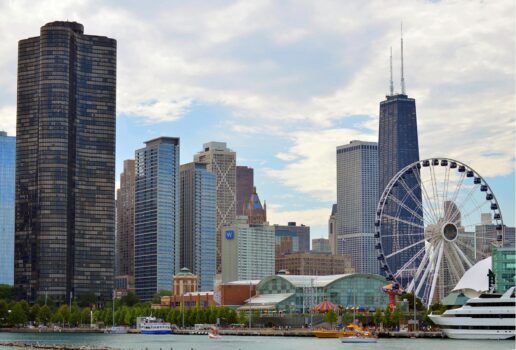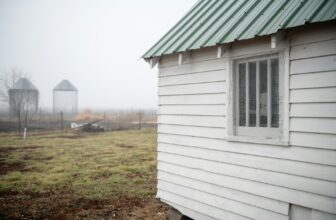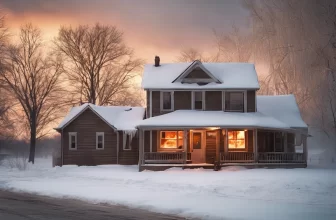With the arrival of spring’s milder days in Chicago, anticipation for reliable air conditioning grows, but sometimes to our surprise, the AC unit is frosty and not working after not being used throughout the winter. The winter in Illinois can be unforgiving, leaving many air conditioning systems in a state of distress. It is important to know why these cooling champions falter when it’s time to transition from heating to cooling.
Why is my AC “Frozen Shut” After The Winter?
Even though your AC is “resting” during the winter, as you rely on your gas furnace, for example, the outdoor unit can still succumb to freezing if there are underlying issues with the system. Also, if there is a lot of moisture in the air around the external unit, especially around its coils, it can continue to freeze and build up ice in, on, and around your unit.
The moisture can also be a result of a clogged or dirty filter. The filter prevents normal airflow, increasing moisture and causing all sorts of problems. If you couple this with the freezing climate of Chicago, Illinois, then it is not a surprise that the HVAC system can freeze over while not being used during the winter season. The HVAC system has a defrost function that should be able to clear it, but if the ice still builds up and won’t go away, then this is a red flag that there is an issue that you need to resolve.
What Else Can Cause the AC to Stop Working Over the Winter?
Other than the moisture and the ice build-up, there are a few reasons that can cause the AC to stop working over the cold season. Here are some of the most common reasons that face homeowners in Illinois.
Illinois’ Extreme Stormy Weather
During the winter and the fall is when Chicago, specially Illinois, experiences an extreme stormy weather. The rain, coupled with the wind can easily push all types of debris and gunk into the HVAC system. Such buildup can easily clog filters, block fans, and drains. Falling branches and larger debris can even cause some heavy damage to the outdoor unit that can make your system inoperable when you need it. Therefore, you should always get in touch with a NATE-certified professional if you notice any damage after a storm.
The Refrigerant Leak
If you turn on the AC on a hot day, expecting a flow of cool air, but you are greeted by a lukewarm breeze. This disappointing scenario often points to an issue with the refrigerant. Operating with insufficient refrigerant isn’t just an obstacle to comfort, it can trigger a series of mechanical issues as well. The evaporator coils, which are integral to the cooling process, depend on the refrigerant to absorb heat. When levels are low, these coils can freeze, ironically leading to less cooling efficiency. This issue might not grab your attention during the winter months, but it’s a critical concern when your system kicks into high gear.
A Tripped Breaker or a Dirty Filter
Sometimes the AC might not work because of a minuscule issue such as a tripped breaker or the emergency shutoff switch. That can happen without you knowing during the winter. The easy fix is to simply flip the breaker or the shut-off switch, and see if that fixes the issue. Another reason might be a dirty or clogged filter, which you can remedy by getting the filter cleaned or replaced.
Simple Tips to Prepare Your AC for the Illinois Summer
Start by visually inspecting your outdoor AC unit. Winter in Chicago can be rough, and it’s not uncommon for debris such as leaves, twigs, and even trash to accumulate around the unit. This debris can obstruct airflow and reduce the efficiency of your system. Carefully remove any foreign objects and gently clean the unit’s fins with a soft brush to prevent bending them. It’s also recommended to check the area around the external unit. Ideally, there should be at least a 2-foot clearance to allow for proper airflow and maintenance access.
Consider Upgrading Insulation and Sealing Leaks
Many think insulation is only beneficial during the cold season, but it plays a vital role in maintaining coolness during summer. Insulation acts as a barrier, decelerating the heat’s journey into your home. This helps preserve the chilled air generated by your AC, ensuring a consistently cool environment.
A thorough inspection of your attic’s insulation is a smart move to prepare for rising temperatures. Look for any signs of thinning insulation or gaps that could invite heat indoors.
Test Your AC Before It Gets Too Hot
Don’t wait for the first hot day in Chicago to turn on your AC. Test your system in the spring to ensure it’s working correctly. If you notice any issues, such as strange noises or a lack of cool air, you’ll have time to address them before you rely on your AC daily.
Keep Internal Doors Open
Keep interior doors open to promote optimal airflow within your home. Closed doors can prevent air from circulating freely, causing your AC to work harder and less efficiently.
Optimize Your Thermostat Settings
Dialing your thermostat up to a comfortably warm setting can lead to significant savings on your energy expenses. Keeping the indoor climate slightly warmer and closer to the outdoor temperature minimizes the workload on your AC, which in turn reduces your cooling costs. You can also optimize the performance by utilizing a smart thermostat, which can be a game changer in your AC’s operation.
By proactively adjusting your AC settings before the summer heat intensifies, and following a few easy tips, you’ll have a consistently comfortable home, reduced energy consumption, and the confidence that comes with knowing your air conditioning is ready to perform efficiently during the warmest months in Chicago.







